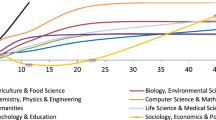Abstract
Policy makers expect increasing numbers of PhDs to find employment in the private sector. However, the incentive structure for completing a PhD and subsequently seeking private sector employment has not been adequately assessed in the literature. This paper investigates the financial incentives for this career choice of recent Danish PhD graduates. The wage premiums associated with holding a PhD compared to a master’s degree are estimated with a program evaluation approach using a matched sample. The empirical results do not indicate significant financial incentives to choose private sector employment early in PhDs’ career. These results stand in contrast to previous studies that find positive returns to PhD education. This paper argues that a key factor behind this difference is the use of a matching approach that eliminates heterogeneity between PhDs and the control group of master’s graduates.

Similar content being viewed by others
Notes
Age differences for matched pairs must be 2 years or less, while differences in high school GPA must be less than 0.5 points from a scale of 0–13.
References
Abadie, A., & Imbens, G. W. (2011). Bias-corrected matching estimators for average treatment effects. Journal of Business and Economic Statistics, 29(1), 1–11.
Agarwal, R., & Ohyama, A. (2013). Industry or academia, basic or applied? Career choices and earnings trajectories of scientists. Management Science, 59(4), 950–970.
Aghion, P., Dewatripont, M., & Stein, J. C. (2008). Academic freedom, private-sector focus, and the process of innovation. The Rand Journal of Economics, 39(3), 617–635.
Becker, G. S. (1965). A theory of the allocation of time. The Economic Journal, 75(299), 493–517.
Blaxter, L., Hughes, C., & Tight, M. (1998). Writing on academic careers. Studies in Higher Education, 23(3), 281–295.
Durette, B., Fournier, M., & Lafon, M. (2014). The core competencies of PhDs. Studies in Higher Education, (ahead-of-print), 1–16.
Gardner, S. K. (2008). What’s too much and what’s too little?”: The process of becoming an independent researcher in doctoral education. The Journal of Higher Education, 79(3), 326–350.
Gemme, B., & Gingras, Y. (2012). Academic careers for graduate students: A strong attractor in a changed environment. Higher Education, 63(6), 667–683.
Gu, X. S., & Rosenbaum, P. R. (1993). Comparison of multivariate matching methods: Structures, distances, and algorithms. Journal of Computational and Graphical Statistics, 2(4), 405–420.
Imbens, G. W., & Wooldridge, J. M. (2009). Recent developments in the econometrics of program evaluation. Journal of Economic Literature, 47(1), 5–86.
Mangematin, V. (2000). PhD job market: Professional trajectories and incentives during the PhD. Research Policy, 29(6), 741–756.
Mangematin, V., Mandran, N., & Crozet, A. (2000). Careers of social science PhD graduates in France—The influence of how the research was done. European Journal of Education, 35(1), 111–124.
Mertens, A., & Röbken, H. (2013). Does a doctoral degree pay off? An empirical analysis of rates of return of German doctorate holders. Higher Education, 66(2), 217–231.
Merton, R. K. (1957). Priorities in scientific discovery: A chapter in the sociology of science. American Sociological Review, 22(6), 635–659.
Metcalf, D. (1973). The rate of return to investing in a doctorate: A case study. Scottish Journal of Political Economy, 20(1), 43–51.
Mincer, J. A. (1974). Schooling and earnings. In J. A. Mincer (Ed.), Schooling, experience, and earnings (pp. 41–63). Columbia: Columbia University Press.
O’Leary, N. C., & Sloane, P. J. (2005). The return to a university education in Great Britain. National Institute Economic Review, 193(1), 75–89.
OECD. (2010). OECD science, technology and industry outlook 2010. Washington, DC: OECD Publishing.
Park, C. (2005). New variant PhD: The changing nature of the doctorate in the UK. Journal of Higher Education Policy and Management, 27(2), 189–207.
Roach, M., & Sauermann, H. (2010). A taste for science? PhD scientists’ academic orientation and self-selection into research careers in industry. Research Policy, 39(3), 422–434.
Roy, A. D. (1951). Some thoughts on the distribution of earnings. Oxford Economic Papers, 3(2), 135–146.
Sauermann, H. & Roach, M. (2012). Taste for Science, Taste for Commercialization, and Hybrid Scientists. Paper Presented at DRUID Conference, June 19–21, Copenhagen Business School, Denmark.
Schneider, P., & Sadowski, D. (2010). The impact of new public management instruments on PhD education. Higher Education, 59(5), 543–565.
Statsrevisionen. (2010). Beretning om satsningen på ph.d.-uddannelse. København: Rosendahls-Schultz Distribution.
Stephan, P. (2012). How economics shapes science. Cambridge: Harvard University Press.
Stern, S. (2004). Do scientists pay to be scientists? Management Science, 50(6), 835–853.
Vejrup-Hansen, P. (2010). Økonomisk afkast af ph.d. uddannelse: Livsindkomst og human capital. National Økonomisk Tidsskrift, 148, 337–352.
Author information
Authors and Affiliations
Corresponding author
Rights and permissions
About this article
Cite this article
Pedersen, H.S. Are PhDs winners or losers? Wage premiums for doctoral degrees in private sector employment. High Educ 71, 269–287 (2016). https://doi.org/10.1007/s10734-015-9901-y
Published:
Issue Date:
DOI: https://doi.org/10.1007/s10734-015-9901-y



